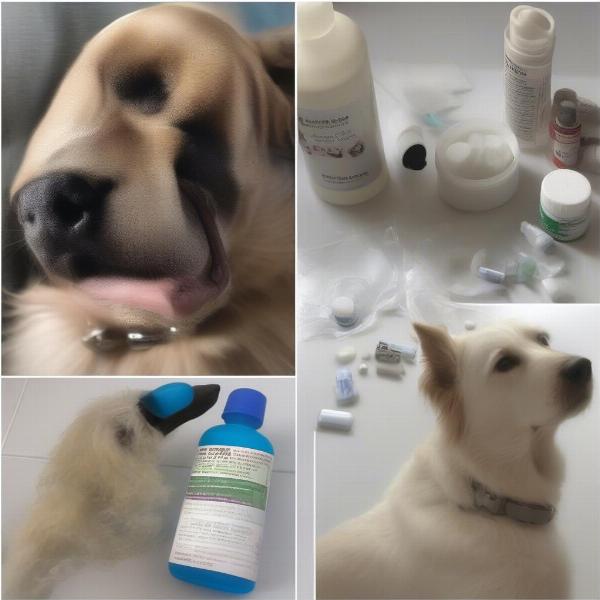Itching in dogs is a common problem that can be caused by a variety of factors, ranging from allergies and parasites to dry skin and infections. Finding the right itching dog medication involves understanding the underlying cause of the itch and choosing a treatment that addresses it effectively. This guide will delve into the various causes of itching in dogs, discuss available medication options, and provide tips for managing your dog’s discomfort. We’ll cover everything from over-the-counter remedies to prescription medications, ensuring you have the knowledge to help your furry friend find relief.
Understanding the Causes of Itching in Dogs
Before considering itching dog medication, it’s crucial to pinpoint the root cause of the problem. Different causes require different treatment approaches. Some common culprits include:
- Parasites: Fleas, ticks, mites, and lice can cause intense itching and skin irritation.
- Allergies: Environmental allergens (pollen, dust mites, mold) and food allergies can trigger allergic reactions manifesting as itchy skin.
- Infections: Bacterial, fungal, and yeast infections can cause itching, redness, and sometimes discharge.
- Dry Skin: Especially common in colder climates or with certain breeds, dry skin can lead to persistent itching.
- Hormonal Imbalances: Conditions like hypothyroidism can contribute to skin problems and itching.
Types of Itching Dog Medication
Once you’ve identified the likely cause of your dog’s itching, you can explore appropriate medication options. Always consult with your veterinarian for a proper diagnosis and treatment plan. Here are some common types of itching dog medication:
Antiparasitic Medications
For parasite-related itching, medications like flea and tick preventatives are essential. These come in various forms, such as topical solutions, oral medications, and collars. Your veterinarian can recommend the best option based on your dog’s lifestyle and the prevalence of parasites in your area.
Antihistamines
Antihistamines can provide relief from allergy-related itching. These medications work by blocking the effects of histamine, a chemical released during allergic reactions. Several over-the-counter antihistamines are available, but it’s essential to consult your veterinarian before administering them to your dog.
Corticosteroids
Corticosteroids are powerful anti-inflammatory medications that can reduce itching and inflammation. They are often prescribed for severe allergic reactions or skin conditions. While effective, corticosteroids can have side effects with long-term use, so they should be used under veterinary supervision.
Antifungal and Antibacterial Medications
If your dog’s itching is caused by a fungal or bacterial infection, your veterinarian may prescribe antifungal or antibacterial medications. These can come in the form of topical creams, ointments, or oral medications.
 Types of Itching Dog Medications
Types of Itching Dog Medications
Home Remedies for Itching in Dogs
Alongside medication, several home remedies can help soothe your dog’s itchy skin:
- Oatmeal Baths: Colloidal oatmeal has anti-inflammatory properties and can help relieve itching.
- Coconut Oil: Applying coconut oil to dry, itchy skin can moisturize and reduce irritation.
- Apple Cider Vinegar: Diluted apple cider vinegar can be sprayed on itchy areas to soothe the skin. However, avoid using it on open wounds.
When to See a Vet
While some itching can be managed at home, it’s crucial to seek veterinary attention if your dog’s itching is severe, persistent, or accompanied by other symptoms such as hair loss, skin lesions, or changes in appetite or behavior.
Conclusion
Finding the right itching dog medication requires a thorough understanding of the underlying cause and careful consideration of available options. Always consult your veterinarian for a proper diagnosis and tailored treatment plan. By addressing the root cause and providing appropriate care, you can help your furry friend find relief from itching and enjoy a comfortable, itch-free life.
FAQ
-
What is the most common cause of itching in dogs? Parasites, such as fleas and mites, are a common cause of itching in dogs.
-
Can I use human antihistamines on my dog? No, always consult your veterinarian before giving your dog any human medication, including antihistamines.
-
Are there any natural remedies for dog itching? Yes, oatmeal baths, coconut oil, and diluted apple cider vinegar can help soothe itchy skin.
-
When should I take my itchy dog to the vet? If the itching is severe, persistent, or accompanied by other symptoms, it’s time to see a vet.
-
What are the potential side effects of itching dog medication? Side effects vary depending on the medication. Consult your veterinarian about potential risks.
Related Articles
- how to help my dogs dry skin
- omega 3 oil for dogs
- how do you help a dog with dry skin
- betagen for dogs
ILM Dog, your trusted resource for dog care and wellbeing, is dedicated to providing expert advice on all aspects of dog ownership, from breed selection and health to training, nutrition, and grooming. We offer a comprehensive range of resources to support dog owners worldwide. Whether you’re a seasoned owner or just starting your journey with a new pup, ILM Dog is here to guide you. For any questions or assistance, please reach out to us via email at [email protected] or by phone at +44 20-3965-8624.